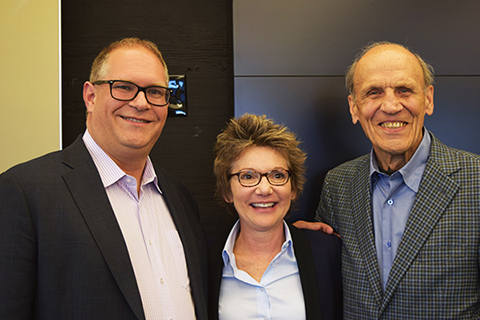Economist Mary Daly: 'Bloom Where You’re Planted'

Entry-level workers should recognize that “non-traditional paths are very valuable,” economist Mary Daly said during the Loeschner Leadership lecture, Alan Perez wrote in the Daily Northwestern.
“People from various backgrounds don’t understand how much they have to offer because they’re not exactly going down a linear path,” said Daly, president and chief executive officer of the Federal Reserve Bank of San Francisco.
Personally, Daly thought she’d overcome her own unconventional background and transform herself. “But it wasn’t until I was brave enough to bring my whole self to work – my ideas, my questions -- that my career took off.”
Fresh off a commencement speech at Syracuse University, Daly spoke with SESP Dean David Figlio in Annenberg Hall as part of the School of Education and Social Policy’s (SESP) Nancy and Ray Loeschner Lecture Series.
The first-term Fed president, who dropped out of high school before receiving her general education development (GED) diploma, called for an “inclusionary” economy that takes advantage of diverse backgrounds, Perez wrote.
Daly, a labor economist whose research includes income inequality and the black-white wage gap, also argued for greater investment in education and more racial and gender diversity in the economics profession. She’s been a prominent voice in addressing the field’s “diversity crisis.”
“Policy reflects the people who make it,” Daly said. “If you have only one type of person around the table making the policy, you’re going to miss a lot of the problems that other people would see. And you’re certainly going to miss the unique solutions they’d be able to offer.”
"The Study of Humans"
A Missouri native, Daly dropped out of school at age 15 and worked at doughnut shops and Target to cobble together a full-time salary. She eventually received her GED and a bachelor's degree in economics and philosophy from the University of Missouri-Kansas City in 1985.
She later earned a master's degree from the University of Illinois Urbana-Champaign in 1987 and a doctorate in economics from Syracuse in 1994. She completed a National Institute on Aging post-doctoral fellowship at Northwestern in 1996.
Her journey, however, was a “crooked one,” she said, adding that she wouldn’t be where she is today if it hadn’t been for Betsy Bane, a mentor who told her to get a GED and paid for her first semester at the University of Missouri-Kansas City.
“I was struggling, my life was in chaos, and Betsy said to me, ‘Mary, you have to bloom where you are planted,’ and then she started investing in my learning,” Daly said. “The key was accepting my situation. Betsy told me, ‘yes, you had a bad draw, but you have one life to live; don’t let them define it.’”
“I had so many people like Betsy in my life,” Daly said. “Sometimes it just takes one person at a critical moment to say ‘yes…and.’”
At the Fed, Daly is interested in how monetary policy interacts with people’s lives and demystifying economics through online education tools, videos, and podcasts. Producing her new podcast “Zip Code Economies” has been a “transformative experience,” because it lets her interact with people in the field, she said
She approaches economics as the “study of people” and believes everyone has the power to change a life. “You have no idea who you are influencing,” Daly said. “Believe that when you are doing right, and you are kind and curious, you will be affecting people and ultimately policy.”
Her advice to students? Focus on small wins; then start scaling. “When you see a problem and you can participate in a solution, you can continue to move the needle every day,” she said.
Daly was the sixth speaker in the program, which presents visionary leaders in education and other fields. In April, Eve Ewing, the author of Ghosts in the Schoolyard, talked about leadership, racial trauma and more with Dean Figlio.
In addition to Ewing, previous speakers in the Loeschner Leadership Series include alumnus Chuck Friedman (BS88) of Microsoft (2018); economist Mischa Fisher (2018); Eva Moskowitz (2015), founder and CEO of Success Academy Charter Schools; and Wendy Kopp (2013), founder of Teach for America.
The lecture, designed to connect students from around Northwestern with talented leaders in a range of industries was established with a gift from SESP alumnus Ray Loeschner (MA57) of Grand Rapids, Michigan, the former president of Olivet University and a trailblazer in higher education. Loeschner, who attends every lecture, also received his PhD from Northwestern in 1962 and served as an assistant football and track coach.